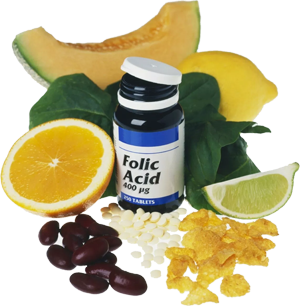Folic acid is vital to healthy pregnancies. The addition of folic acid, which comes in the synthetic form known as folate, can help protect the well-being of a developing fetus’ brain and spinal cord. It also helps to combat against neural tube defects (NTDs), which impacts thousands of pregnancies worldwide.
Neural tube defects can present themselves at the beginning of pregnancy, even before the person knows that they are pregnant. For this reason, it is advisable to begin taking a folate supplement before you attempt to conceive or if you’re not using contraceptives to prevent pregnancy. This helps to safeguard developing fetuses from a slew of health problems, ranging from NTDs to cleft lips and palates.
Folic acid is responsible for a great number of things that encourage a healthier pregnancy. This includes the production of red blood cells, the production, and repair of DNA, and the growth of a healthy placenta. Truly, this vitamin is a must if you may be or currently are pregnant.
Folic Acid Recommendations
 400 micrograms of folic acid daily are recommended for those who are planning to or are currently pregnant. Because many pregnancies are unplanned, many experts advise that all women of childbearing age who have relationships with men begin taking these 400 micrograms on a daily basis.
400 micrograms of folic acid daily are recommended for those who are planning to or are currently pregnant. Because many pregnancies are unplanned, many experts advise that all women of childbearing age who have relationships with men begin taking these 400 micrograms on a daily basis.
Once pregnancy occurs, the recommendation for folic acid dosages increases to 600 micrograms per day. Gestation is hard work for the body and folic acid helps to nurture this biological process for both the mother and the child. Other things such as peptides or natural remedies may see benefits also.
Prescription prenatal vitamins may contain even more folic acid than that. It’s not uncommon for prescription vitamins to possess 800 to 1,000 micrograms per daily dose.
When choosing an over-the-counter supplement, make sure to pay mind to the label. This will show you how much folic acid is present in your multivitamin. If your multivitamin does not have a satisfactory level of folate (or any at all), it’s a wise idea to take a separate folic acid supplement.
Your doctor will be able to best recommend the proper daily dosage for your body. Many aspects of a person’s medical history impact the recommendations that the doctor will make. Obese patients, patients who have birthed children with NTDs before, and patients with certain conditions may be instructed to take a higher amount of folic acid each day.
Never take more than one multi-vitamin per day and never exceed 1,000 micrograms of folic acid unless recommended by your doctor.

